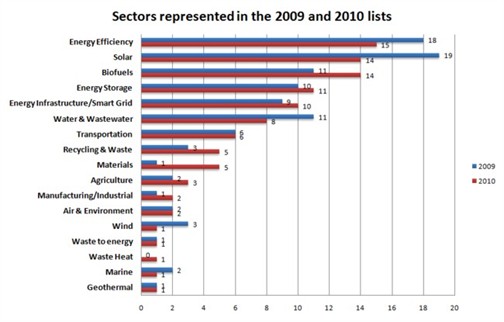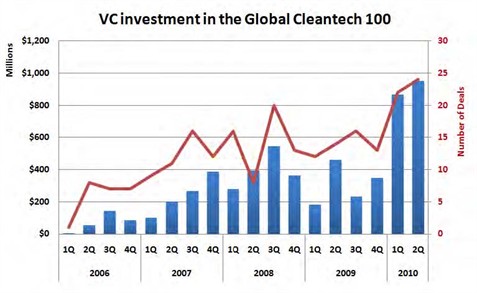What's in store as Clean Technology goes mainstream?

Last week the
Cleantech Group(tm), a leading global research, advisory, and events
firm, unveiled its second annual Global Cleantech 100 list of
the most promising private clean technology companies on the
Planet.
The selected companies are seen as those most likely to make a
significant market impact over the next 5-10 years, according to
the Cleantech Group’s 60-strong expert panel.
The report accompanying the list describes the evaluation
methodology and provides background profiles of the selected firms.
It also provides interesting insights on how the cleantech sector
is unfolding globally.
Richard Youngman, Managing Director, Europe & Vice
President, Global Research at Cleantech Group noted in the press
statement that accompanied the release of the Top 100 List “There
have been significant changes since 2009: more Asian companies and
less renewable energy generation companies attest to the growing
diversification of cleantech innovation.”
“Cleantech is a broader phenomenon than just clean energy. The
wider issues of resource scarcity are starting to gain attention
and traction,” he added.

Key facts and findings:
A number of key facts from the Cleantech Top 100 report are
worth noting:
- Of the top 100 for 2010, only 43 were
on the 2009 list. This high turnover is indicative of
the relative infancy of the cleantech wave of innovation. - A related observation is the relative newness of the sector.
Only 11 of the top 100 firms were in existence before 2000. As well
as being new, these firms tend also to be very small. Almost half
of the top 100 leaders consist of less than 50 employees. Despite
their youth and small size, however, two-thirds of these start ups
are actively ‘shipping product’ to customers. - The second key observation is the breadth and diversity of
cleantech innovation. North America’s share increased from
55% to 57% of the overall findings, Asia-Pacific’s from 3% to 7%,
at the expense of Europe and Israel, whose overall share declined
from 42% to 37%. - While the U.S. is still the dominant player in the sector, with
more than half the selected 100 companies, many of these companies
have partnerships that extent far beyond North America. - Canada had only two firms on the list: Enerkem Energy
generation from Montreal, operators of one of the world’s first
industrial-scale biofuel projects using household and other
municipal waste as the main input ingredient; and Vancouver-based
Ostara Nutrient Recovery Technologies, with a technology that
extracts phosphorous from wastewater and converts it into an
environment-friendly, slow-release commercial fertilizer. - Asia’s influence in cleantech is clearly on the rise. No longer
just a low cost manufacturing center or end market for technology
deployment, Asia is coming into the cleantech limelight. China has
3 companies in the 2010 Global Cleantech 100; it had none last
year. - In the U.S., California retains its leadership in creating and
growing venture capital-funded, innovation-based companies.
However, the sheer spread of U.S. states and countries across the
world is a clear reminder of how geographically diverse and global
is the cleantech revolution. - In 2010, Energy Efficiency has overtaken Solar as the hottest
sub-sector within cleantech, with 15 companies on the list.
Biofuels matched Solar, with 14 companies. - Smart Grid is the most active partnership space within
cleantech. Silver Spring Networks is the highest-ranking 2010
Global Cleantech 100 company.
The cleantech sector is much more than just clean energy. In
fact, the renewable energy generation technology share of the
Cleanetch100 fell from 37 to 33, 2009 to 2010.
Over 200 investing entities, from more than 20 countries, have a
shareholding in the 100 companies. VantagePoint Venture Partners is
the most prolific shareholder of 2010 Global Cleantech 100
companies with 13 investee companies on the list, a
testament to its longevity in the space. It has
overtaken Kleiner Perkins by one.

Corporations are also becoming ever more active in global
cleantech innovation - as investors, partners, licensees,
customers, and acquirers of Global Cleantech 100 companies. Google,
GE, IBM, PG&E, and Siemens, are the most active partners with
2010 Global Cleantech 100 companies.
What the future holds is uncertain. Countries like Brazil and
India certainly will expand their involvement in the cleantech
realm, as will China, Japan, Korea and possibly some new European
players. Particular attention should be paid to companies involved
in urban mobility such as Israel’s Better Place and U.S. based Zip
Car as the electric car revolution takes hold.
In tandem with this development, Smart Grid technology providers
will also be entities to watch, as the world’s aging energy
distribution grids undergo a much need overhaul to meet rising
demand.
What does this micro sampling tell us?
The key message is that good ideas can find the investment
backing needed to get from the test bench to the marketplace, and
that youth and agility are the assets that can make brash start ups
commercial winners. This by no means suggests that process will be
easy. As any start up entrepreneur knows, finding investment
capital is always a challenge.
And with respect to Canada’s low representation on the Top 100
list, as Nicholas Parker, executive chairman of the Cleantech
Group, said to the Toronto Star’s Tyler Hamilton in a recent
target=”_blank”>column “There’s no question that U.S.
companies attract more attention than those in other countries, but
the fact is that while we innovate well in Canada, we’re less good
at growing global companies and part of the reason for this is
capital scarcity.”
The second key message is that these good ideas can come from
any part of the world and that traditional trade and commerce
barriers need not be impediments to global success. But again,
quoting Tyler Hamilton, “… Canadian cleantech companies have to
do a better job of getting themselves known. Coming up with great
technologies doesn’t do anyone much good if it’s done in
isolation.”
Source: GLOBE-Net
You can return to the main Market News page, or press the Back button on your browser.

